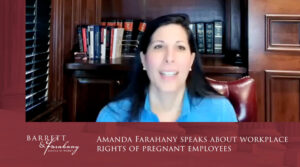Complimentary Phone Consult with an Attorney Today
New Employment Cases 334-237-7773The Pregnancy Discrimination Act of 1978 (PDA) is a federal law passed by Congress in 1978 as an amendment to Title VII of the Civil Rights Act of 1964. The PDA was created in response to a Supreme Court Decision (General Electric Co. vs. Gilbert, 1976) in which the court ruled that pregnancy discrimination was not necessarily illegal. The 1978 Title VII amendment defined sex discrimination to include pregnancy, childbirth, and related conditions within any aspect of employment.
The PDA requires employers to treat employees who are temporarily unable to work due to pregnancy or its symptoms equally with those who are temporarily unable to work for other reasons. The PDA also prohibits employers from common discriminatory policies such as firing women who become pregnant, refusing to hire pregnant women, and similar practices.

There are no special rights granted to pregnant employees under the PDA. The law simply requires employers to treat pregnant employees the same as other employees. For example, if an employer’s policy is to give light work duty to employees suffering from temporary disabilities, they must also allow pregnant employees to perform these same types of work assignments.
If you have a hunch that you’re being treated unfairly due to your pregnancy, don’t hesitate to act. Get in touch with one of our pregnancy discrimination lawyers in Atlanta, GA, to know where you stand and to learn how we can help you navigate your situation.
Examples of Pregnancy Discrimination
Violations of the Pregnancy Discrimination Act can occur at any time during the employment cycle – from the initial employment interview through termination and all points in between. Some common examples of pregnancy discrimination include:
Refusal to Hire an Applicant Because They Are Pregnant
If a job applicant is pregnant or may become pregnant in the future, an employer is not allowed to use this as a reason not to hire her. The same holds true for a pregnant employee who is applying for a different position within the same organization. Many employers try to justify this by saying they are looking for someone to work “long-term” or using similar language. This is illegal, as the employer is making a general assumption about the prospective employee’s future work abilities based solely on the fact that she is pregnant.
Harassing a Pregnant Employee
Some workplaces promote a hostile environment for pregnant employees, such as being subjected to insults, offensive comments, jokes, assaults, threats, and intimidation that interfere with a pregnant woman or new mother’s ability to perform their work. This type of conduct may come from a manager/supervisor, co-worker, business partner, or anyone else the pregnant employee comes in contact within the workplace.
Denying a Promotion to or Demoting a Pregnant Employee
Employers sometimes refuse to consider an employee for a promotion simply because she is pregnant. Another common practice is to demote a pregnant employee to a “less stressful” job or even force them to take time off. Sometimes, this may be done with good intentions out of concern for the employee’s health. Regardless of intentions, however, it is still illegal. Whether or not a pregnant employee can still perform certain tasks is not up to the employer to decide. It is between her and her doctor.
Refusal to Reasonably Accommodate a Pregnant Employee
Pregnant employees must receive the same workplace accommodations as other employees with temporary disabilities. As mentioned earlier, if other temporarily disabled employees are allowed to perform light tasks, pregnant employees should be afforded the same opportunity.
Restricting Medical Leave for Pregnant Employees
Employees with physical limitations due to pregnancy must be allowed medical leave under the same terms and conditions as other employees with medical impairments. In other words, if short-term leave is provided for other employees with temporary disabilities, these same policies must be applied to pregnant employees. In addition, under the Family Medical Leave Act (FMLA), employers must allow pregnant employees to return after their leave to their previous position or one similar in pay and benefits.
Retaliating Against a Pregnant Employee or One of Her Supporters
It is illegal for an employer to fire, demote, harass, or otherwise retaliate against an employee who opposes pregnancy discrimination in the workplace, files a pregnancy discrimination lawsuit, or is part of a pregnancy discrimination proceeding. Your pregnancy discrimination attorney should be able to tell you more in this regard.
Firing or Laying Off a Pregnant Employee
An employer is not allowed to fire an employee, lay her off, or reduce her work hours simply because she is pregnant. Even if the employer cites health and safety concerns, this is still not a valid reason for termination.
Filing a Pregnancy Discrimination Charge
If you believe your employer has discriminated against you because you are pregnant, know that this is a violation of the Pregnancy Discrimination Act of 1978. The first step is to consult with a pregnancy discrimination lawyer and file a charge of discrimination with the Equal Employment Opportunity Commission (EEOC).
In Alabama, Georgia, and Illinois this charge must be filed within 180 days of the employment discrimination incident. Barrett & Farahany can help you file your charges and guide you through the EEOC’s investigation process.
Once your pregnancy discrimination charge is received, the EEOC may investigate your claim, invite you to participate in mediation with your employer, or issue you a “right to sue” letter – you may request this letter from the EEOC if you plan to sue your employer for pregnancy discrimination. Once you receive your “right to sue” letter, you have just 90 days to file your lawsuit.

Why Should You Hire a Pregnancy Discrimination Lawyer?
When it comes to protecting your rights at work, hiring a pregnancy discrimination lawyer can be a game-changer. Here’s why.
- A pregnancy discrimination attorney knows the ins and outs of the legal landscape. Hence, they can protect you and help you understand if your situation calls for legal action.
- Lawyers know how to communicate with employers professionally and assertively. They’ll focus on resolving the issue rather than escalating tensions.
- Sometimes, it’s tough to figure out if you’re facing pregnancy discrimination or just dealing with a tough workplace. A pregnancy discrimination lawyer can help you identify specific instances of discrimination and build a case based on solid evidence.
- Knowing you have a professional on your side can bring a sense of relief. It’s like having a safety net – someone who knows the ropes and has your back throughout the process.
Working with a seasoned attorney can empower you to stand up against unfair treatment in the workplace. Talk to our pregnancy discrimination lawyer in Atlanta, GA, and let us work together to protect your rights.
Contact a Pregnancy Discrimination Attorney Today
If you are planning to bring a pregnancy discrimination lawsuit against your employer, time is of the essence. For this reason, it is important to speak with a seasoned employment rights attorney or pregnancy discrimination lawyer in Atlanta, GA, as soon as possible. Barrett & Farahany has extensive experience with pregnancy discrimination litigation and can thoroughly assess your case, review your options, and help determine the best legal path toward a favorable outcome.
At Barrett & Farahany, we’re dedicated to helping working mothers get the fair treatment they deserve. Don’t hesitate to contact our pregnancy discrimination attorneys for help.
Talk To An
Attorney Today
By submitting this form, you are agreeing to receive emails as well as text messages from Barrett & Farahany.
Barrett & Farahany
Georgia Office
3344 Peachtree Road NE, Suite 800
Atlanta, GA 30326
334-237-7773
Alabama Office
2 20th St N, Suite 900,
Birmingham, AL 35203
866-951-0903
Illinois Office
77 W. Wacker Dr. Suite 4500
Chicago, IL 60601
773-337-7999
Phone
Existing Clients: 866-989-0120


